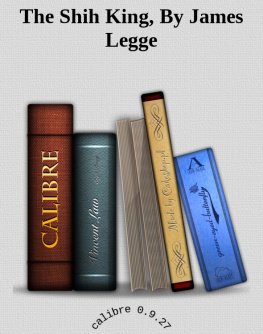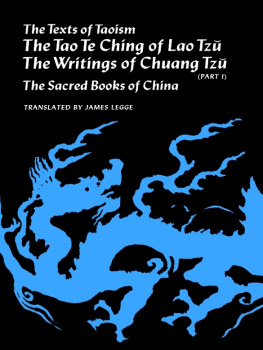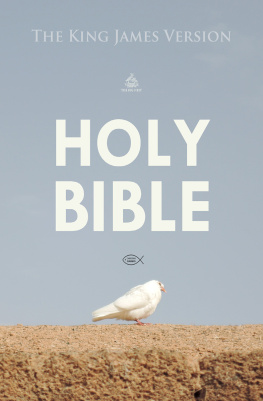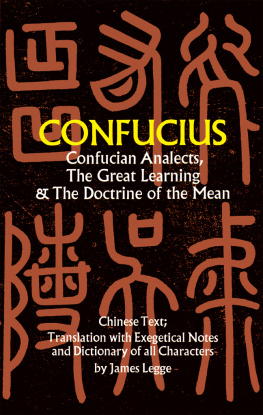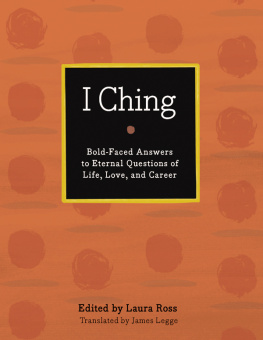James Legge - The Yi King or, Book of Changes
Here you can read online James Legge - The Yi King or, Book of Changes full text of the book (entire story) in english for free. Download pdf and epub, get meaning, cover and reviews about this ebook. year: 0, genre: Science fiction / Religion. Description of the work, (preface) as well as reviews are available. Best literature library LitArk.com created for fans of good reading and offers a wide selection of genres:
Romance novel
Science fiction
Adventure
Detective
Science
History
Home and family
Prose
Art
Politics
Computer
Non-fiction
Religion
Business
Children
Humor
Choose a favorite category and find really read worthwhile books. Enjoy immersion in the world of imagination, feel the emotions of the characters or learn something new for yourself, make an fascinating discovery.

- Book:The Yi King or, Book of Changes
- Author:
- Genre:
- Year:0
- Rating:4 / 5
- Favourites:Add to favourites
- Your mark:
- 80
- 1
- 2
- 3
- 4
- 5
The Yi King or, Book of Changes: summary, description and annotation
We offer to read an annotation, description, summary or preface (depends on what the author of the book "The Yi King or, Book of Changes" wrote himself). If you haven't found the necessary information about the book — write in the comments, we will try to find it.
The Yi King or, Book of Changes — read online for free the complete book (whole text) full work
Below is the text of the book, divided by pages. System saving the place of the last page read, allows you to conveniently read the book "The Yi King or, Book of Changes" online for free, without having to search again every time where you left off. Put a bookmark, and you can go to the page where you finished reading at any time.
Font size:
Interval:
Bookmark:
I wrote out a translation of the Y King, embracing both the Text and the Appendixes, in 1854 and 1855; and have to acknowledge that when the manuscript was completed, I knew very little about the scope and method of the book. I laid the volumes containing the result of my labour aside, and hoped, believed indeed, that the light would by and by dawn, and that I should one day get hold of a clue that would guide me to a knowledge of the mysterious classic.
Before that day came, the translation was soaked, in 1870, for more than a month in water of the Red Sea. By dint of careful manipulation it was recovered so as to be still legible; but it was not till 1874 that I began to be able to give to the book the prolonged attention necessary to make it reveal its secrets. Then for the first time I got hold, as I believe, of the clue, and found that my toil of twenty years before was of no service at all.
What had tended more than anything else to hide the nature of the book from my earlier studies was the way in which, with the Text, ordinarily and, as I think, correctly ascribed to king Wn and his son Tan, there are interspersed, under each hexagram, the portions of the Appendixes I, II, and IV relating to it. The student at first thinks this an advantage. He believes that all the Appendixes were written by Confucius, and combine with the text to form one harmonious work; and he is glad to have the sentiments of the three sages brought together. But I now perceived that the composition of the Text and of the Appendixes, allowing the Confucian authorship of the latter, was separated by about 700 years, and that their subject-matter was often incongruous. My first step towards a right understanding of the Y was to study the Text by itself and as complete in itself. It was easy to do this because the imperial edition of 1715, with all its critical apparatus, keeps the Text and the Appendixes separate.
The wisdom of the course thus adopted became more apparent by the formation of eight different concordances, one for the Text, and one for each of the Appendixes. They showed that many characters in the Appendixes, and those especially which most readily occur to sinologists as characteristic of the Y, are not to be found in the Text at all. A fuller acquaintance, moreover, with the tone and style of the Appendixes satisfied me that while we had sufficient evidence that the greater part of them was not from Confucius, we had no evidence that any part was his, unless it might be the paragraphs introduced by the compiler or compilers as sayings of the Master.
Studying the Text in the manner thus described, I soon arrived at the view of the meaning and object of the Y, which I have described in the second chapter of the Introduction; and I was delighted to find that there was a substantial agreement between my interpretations of the hexagrams and their several lines and those given by the most noted commentators from the Han dynasty down to the present. They have not formulated the scheme so concisely as I have done, and they were fettered by their belief in the Confucian authorship of the Appendixes; but they held the same general opinion, and were similarly controlled by it in construing the Text. Any sinologist who will examine the Y K ih Z h K iang Y King K ieh , prepared by one of the departments of the Han Lin college, and published in 1682, and which I have called the Daily Lessons, or Lectures, will see the agreement between my views and those underlying its paraphrase.
After the clue to the meaning of the Y was discovered, there remained the difficulty of translating. The peculiarity of its style makes it the most difficult of all the Confucian classics to present in an intelligible version. I suppose that there are sinologists who will continue, for a time at least, to maintain that it was intended by its author or authors, whoever they were, merely as a book of divination; and of course the oracles of divination were designedly wrapped up in mysterious phraseology. But notwithstanding the account of the origin of the book and its composition by king Wn and his son, which I have seen reason to adopt, they, its authors, had to write after the manner of diviners. There is hardly another work in the ancient literature of China that presents the same difficulties to the translator.
When I made my first translation of it in 1854, I endeavoured to be as concise in my English as the original Chinese was. Much of what I wrote was made up, in consequence, of so many English words, with little or no mark of syntactical connexion. I followed in this the example of P. Regis and his coadjutors (Introduction, page p. 9) in their Latin version. But their version is all but unintelligible, and mine was not less so. How to surmount this difficulty occurred to me after I had found the clue to the interpretation;in a fact which I had unconsciously acted on in all my translations of other classics) namely, that the written characters of the Chinese are not representations of words, but symbols of ideas, and that the combination of them in composition is not a representation of what the writer would say, but of what he thinks. It is vain therefore for a translator to attempt a literal version. When the symbolic characters have brought his mind en rapport with that of his author, he is free to render the ideas in his own or any other speech in the best manner that he can attain to. This is the rule which Mencius followed in interpreting the old poems of his country:We must try with our thoughts to meet the scope of a sentence, and then we shall apprehend it. In the study of a Chinese classical book there is not so much an interpretation of the characters employed by the writer as a participation of his thoughts;there is the seeing of mind to mind. The canon hence derived for a translator is not one of license. It will be his object to express the meaning of the original as exactly and concisely as possible. But it will be necessary for him to introduce a word or two now and then to indicate what the mind of the writer supplied for itself. What I have done in this way will generally be seen enclosed in parentheses, though I queried whether I might not dispense with them, as there is nothing in the English version which was not, I believe, present in the writers thought. I hope, however, that I have been able in this way to make the translation intelligible to readers. If, after all, they shall conclude that in what is said on the hexagrams there is often much ado about nothing, it is not the translator who should be deemed accountable for that, but his original.
I had intended to append to the volume translations of certain chapters from K Hs and other writers of the Sung dynasty; but this purpose could not be carried into effect for want of space. It was found necessary to accompany the version with a running commentary, illustrating the way in which the teachings of king Wn and his son are supposed to be drawn from the figures and their several lines; and my difficulty was to keep the single Y within the limits of one volume. Those intended translations therefore are reserved for another opportunity; and indeed, the Sung philosophy did not grow out of the Y proper, but from the Appendixes to it, and especially from the third of them. It is more Toistic than Confucian.
When I first took the Y in hand, there existed no translation of it in any western language but that of P. Regis and his coadjutors, which I have mentioned above and in various places of the Introduction. The authors were all sinologists of great attainments; and their view of the Text as relating to the transactions between the founders of the K u dynasty and the last sovereign of the Shang or Yin, and capable of being illustrated historically, though too narrow, was an approximation to the truth. The late M. Mohl, who had edited the work in 1834, said to me once, I like it; for I come to it out of a sea of mist, and find solid ground. No sufficient distinction was made in it, however, between the Text and the Appendixes; and in discussing the third and following Appendixes the translators were haunted by the name and shade of Confucius. To the excessive literalness of the version I have referred above.
Font size:
Interval:
Bookmark:
Similar books «The Yi King or, Book of Changes»
Look at similar books to The Yi King or, Book of Changes. We have selected literature similar in name and meaning in the hope of providing readers with more options to find new, interesting, not yet read works.
Discussion, reviews of the book The Yi King or, Book of Changes and just readers' own opinions. Leave your comments, write what you think about the work, its meaning or the main characters. Specify what exactly you liked and what you didn't like, and why you think so.

